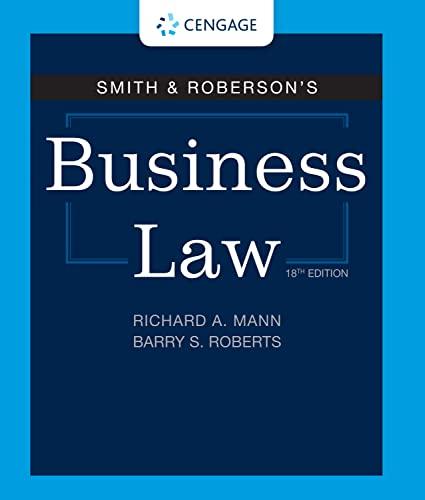Question
Based on the information of 2014 - Tsilhqot'in answer three questions. 1. Explain the effects on the B/S and I/S of the decision
Based on the information of "2014 - Tsilhqot'in" answer three questions.
1. Explain the effects on the B/S and I/S of the decision property rights change and the routine audit undertaken by CPA/External Auditors.
2. Explain the effects on control of resources for reporting issuers when property right change and changes to Those Charged With Governance corporate governance responsibilities.
3. Explain the effect on risk to rates of return for users (investors, creditors etc) that can affect a reporting entity's access to desired capital.
2014 - Tsilhqot'in secured a declaration of "ownership rights similar to those associated with fee simple, including: the right to decide how the land will be used; the right of enjoyment and occupancy of the land; the right to possess the land; the right to the economic benefits of the land; and the right to pro-actively use and manage the land"
"Tsilhqot'in title supplanted the Crown's wrongfully asserted "beneficial interest" within the claim area. In the process this declaration changed non-Aboriginal peoples' relationship with Aboriginal title lands. The Crown can no longer derive direct economic benefits from Aboriginal title lands. The Crown's beneficial interest is vacated. This changes property law in Canada...Neither private property nor Aboriginal title is absolute in Canadian law...the Delgamuukw principle that exclusive occupation can be shared [i.e. communal] between First Nations as "recognized by either de facto practice or by the aboriginal system of governance...No one has absolute interests in land in Canada. Law mediates these competing and complementary claims to protect individuals and advance the public interest. Thus while a fee simple interest is the common law's "largest known estate in land", it is not an unqualified interest. ...all landholders in Canada (Aboriginal, Crown, third-party) have less than an absolute interest in their lands for our mutual health and benefit..." (Borrows, John (2015); Aboriginal Title and Private Property. The Supreme Court Law Review: Osgoode's Annual Constitutional Cases Conference)
Step by Step Solution
There are 3 Steps involved in it
Step: 1

Get Instant Access to Expert-Tailored Solutions
See step-by-step solutions with expert insights and AI powered tools for academic success
Step: 2

Step: 3

Ace Your Homework with AI
Get the answers you need in no time with our AI-driven, step-by-step assistance
Get Started


